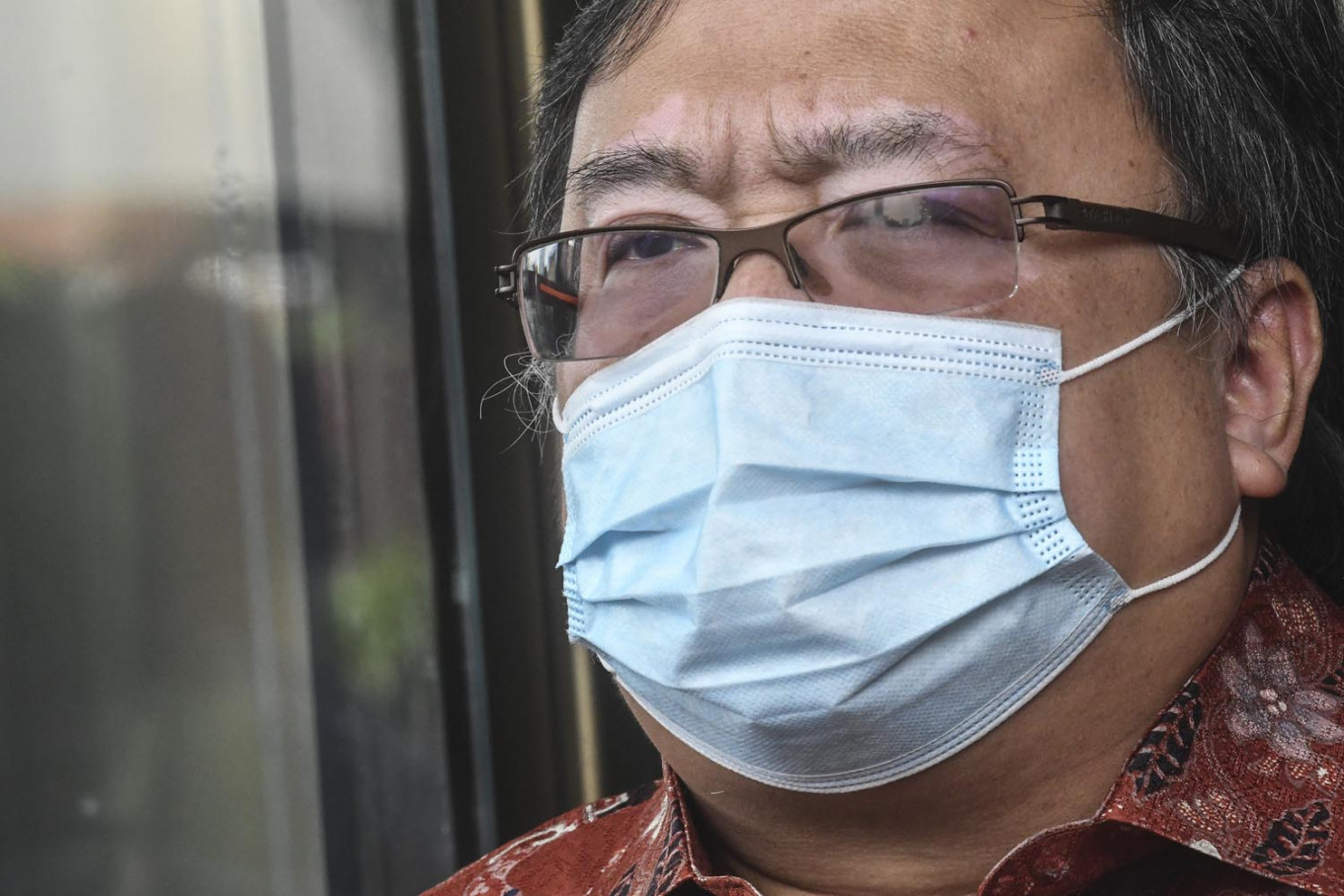Popular Reads
Top Results
Can't find what you're looking for?
View all search resultsPopular Reads
Top Results
Can't find what you're looking for?
View all search resultsGovt claims jobs law to spur innovation but science academies have some doubts
Two science academies, the AIPI and the ALMI, say applied research without strong basic research, which Indonesia does not have at the moment, will not make a good foundation for innovation.
Change text size
Gift Premium Articles
to Anyone
 Research and Technology Minister and National Research Agency (BRIN) head Bambang Brodjonegoro recently said that the Job Creation law would help “downstream research”, government jargon for making research applicable for commercial purposes through greater participation of state-owned enterprises (SOEs) and regional institutions. (Antara/Muhammad Adimaja)
Research and Technology Minister and National Research Agency (BRIN) head Bambang Brodjonegoro recently said that the Job Creation law would help “downstream research”, government jargon for making research applicable for commercial purposes through greater participation of state-owned enterprises (SOEs) and regional institutions. (Antara/Muhammad Adimaja)
T
he government was proud to announce that the Job Creation Law would encourage more applied research, and later innovation, but scientists said it would not work well if Indonesia did not pay more attention to basic research.
Research and Technology Minister and National Research Agency (BRIN) head Bambang Brodjonegoro said last week that the law would help “downstream research”, government jargon for making research applicable for commercial purposes through greater participation of state-owned enterprises (SOEs) and regional institutions.
“With [easier] research and innovation downstreaming, coupled with economic digitization and encouragement to spur start-ups, the ministry believes we can accelerate our economic leverage, including creating new jobs, which would overcome unemployment and poverty,” said Bambang, as quoted by the ministry’s press release.
He cited Article 120 of the law as an example of SOE involvement. The article states that the central government can give “special assignments” to SOEs for “the function of public benefits”, although the law does not explicitly cite research as part of its “special assignments”.
State-owned enterprises have previously taken part in research and innovations. However, direct appointments from the government have yet to be formalized in previous laws.
He also said that Article 121 of the law would encourage greater regional institution involvement. The article stipulates that the country could source its human and natural resources from the region, meaning that conducting research would not only involve the central government and universities in the capital.
The government believes that supporting research downstreaming could spur innovations that would bolster Indonesia’s efforts to independently solve its problems, as recent indexes show that Indonesia still lags behind in terms of innovation.
Read also: Jokowi wants BRIN to take center stage in research efforts
Indonesian Young Academy of Science (ALMI) secretary-general Berry Juliandi applauded the government for supporting applied research by easing the downstreaming process. However, lawmakers could improve the law by citing research, development and innovation as among purposes for its “special assignment” to SOEs, he said.
He also urged the government to play a bigger role in supporting basic research, which he said had contributed to much of the innovation successes in other countries.
Basic research is curiosity-driven research that aims to improve scientific theories for better understanding and prediction of various phenomena. Applied research, on the other hand, has specific commercial objectives in the form of products, procedures or services that aim to solve practical problems.
Berry added that basic research may identify and answer future needs that Indonesia may not know now and can be used as a basis for future research.
“Right now, most ‘downstream’ research has not purely been from basic research conducted in the country. This may pose a risk for our country’s independence,” warned Berry, adding that Indonesia would be unprepared to face future problems with a lack of basic research.
Authorities should instead allow industry players to invest in applied research by making use of “super tax deductions” while the government focuses on funding basic research, he said.
Read also: Jokowi issues rule on tax deductions of up to 300% of R&D cost
The government should also provide relief from sanctions should the companies be found to have previously not paid taxes during an audit, which he said had discouraged companies from applying for the tax initiative.
Indonesian Sciences Academy (AIPI) chairman Satryo S. Brodjonegoro agreed that the jobs law would eventually spur applied research.
As relaxations in the law would attract more investors to Indonesia, investors would be incentivized through various ministerial regulations to add value to their products, meaning more applied research would take place in the value-adding process, Satryo, who is coincidentally the minister's brother, explained.
But Satryo said Indonesia needed more regulations and funding to support basic research while simultaneously supporting its industries to develop basic research to become applicable. “Countries who are weak in basic research would never have a strong industrial sector,” he stressed.
Read also: In need of innovation: Ma’ruf calls on researchers to take country forward
The Global Innovation Index shows that innovation in Indonesia has stagnated in the past seven years, with Indonesia ranking 85th in the 2019 index – the lowest of all G20 nations. It also ranked second-lowest among its ASEAN peers last year.
Indonesia’s ranking in the World Economic Forum’s global competitiveness index also dropped five places in 2019 to 50th out of 141 economies as a result of a stagnating “innovation ecosystem” and stagnating human capital development, among other variables.









